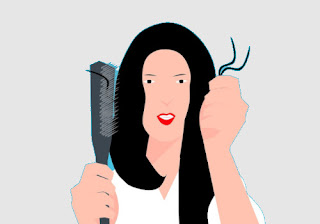7 Biotin Benefits for Hair Growth and Side Effects

Friends, you must have heard about a vitamin called Biotin nowadays. If you are also struggling with hair loss, then a friend or a doctor must have advised you to eat Biotin. What is Biotin, what are the biotin benefits for hair growth and side effects? What can be the loss due to its reduction, and from where do we get it?
In this article We’re going to Read
- What is Biotin
- Biotin Benefits for Hair Growth and Side Effects
- Dosage of Biotin for Hair Growth
- How to use of Biotin for Hair Growth
- Biotin-rich foods
- Biotin Hair Growth Side effects
- Biotin Drink For Hair Growth
What is Biotin?
Biotin or Vitamin B7 is an essential nutrient for your hair and skin. It stimulates the production of keratin, which is necessary for hair growth and increases follicle growth. Biotin for hair is one of the most trending supplements you will find on social media.
There is limited research on Biotin, but we bring you all you need to know about it. Read the article to know all about Biotin and the benefits of Biotin for hair growth.
Biotin Benefits for Hair Growth and Side Effects

Here is the list of biotin benefits for hair growth and side effects. Please read below for details-
1. Stimulates the Production of Keratin
Biotin is known to promote the production of keratin in your body and also stimulates follicle growth. It improves the overall health and quality of your hair.
Biotin promotes hair growth and makes your hair thick. Keratin is an essential protein that makes your hair strong. Biotin improves the structure of keratin in the body.
2. Prevents Hair Loss
By taking Biotin supplements, hair fall stops, and hair growth occurs. If there is a deficiency of Biotin in the body, then the hair starts falling a bit.
3. Improves Hair Growth
Biotin is often associated with promoting hair growth, hair health, and strong hair. However, the evidence to prove this is scant.
It has been proved in many types of research that the deficiency of Biotin leads to hair loss. This tells that the biotin vitamin is essential for hair.
But it is not a substitute for any treatment or treatment for hair. At the same time, many companies promote Biotin in the market as a magical supplement. This is not completely correct. Only those whose body is deficient in Biotin, only those people benefit from consuming its supplements.
But, since Biotin improves hair growth, they can consume it after consulting a doctor if healthy people want.
4. Strengthen Hair
The most significant benefit of Biotin for hair growth is that it improves hair growth, causing your hair to thicken and seem shinier. Biotin can also help hair look stronger while growing more shortly and sustainably.
5. Repairs Damaged Hair
Biotin helps in getting healthy hair an extra boost. Biotin drugs also help those people who strive for nutrient deficiencies repair their unhealthy hair loss and dry, brittle hair. It helps to repair your damaged hair, splits, and hair loss.
6. Lustrous Hair
This is good news for healthy people who like their hair to look its best and those with health problems that lacklustre hair. It boosts hair growth, causing hair to look thicker and seem more lustrous.
7. Reverse Premature Greying of Hair
Biotin improves hair growth. It cares for hair loss-related disorders, and it thickens and strengthens the hair. The best benefit of Biotin for hair growth is that it can reverse premature greying of hair.
Research has revealed the role of diet in deterring off or reversing hair discolouration. The study instructs that low levels of Biotin together with folic acid in the body may result in grey hair.
Dosage of Biotin for Hair Growth

The Food and Drug Administration (FDA) does not contain a daily recommended dietary allowance for Biotin. However, an intake of 30 micrograms (mcg) may be sufficient as per recommendation.
The regular intake of Biotin in Western regions, excluding the United States, is approximately 35–70 mcg per day.
It is rare for an individual to maintain a biotin deficiency, and most people in the U.S. naturally get good gastrointestinal bacteria and a balanced diet.
How to use of Biotin for Hair Growth
While most people can intake biotin supplements without any adverse reactions, but it’s goat’s to visit your doctor before putting any supplements into your daily routine.
They may recommend some particular dietary changes or a biotin supplement. You should make sure to follow any dosage guidelines that they provide.
When we aren’t, aren’t all of our vitamins and nutrients from the foods we intake, we need to take supplements. You can sustain a healthy biotin level by consuming meat, eggs, fish, seeds, nuts, and vegetables like spinach, broccoli, and sweet potatoes.
Biotin-rich foods

You’re already receiving the daily proposed amount of Biotin from the diet you eat. But if you want to boost your intake, you can put more biotin-rich foods into your diet.
These include:
● organ meats, such as liver or kidney
● egg yolk
● nuts, such as almonds, peanuts, and walnuts
● soybeans and other legumes
● whole grains
● bananas
● cauliflower
● mushrooms
Biotin Hair Growth Side effects

It is said that if something is taken more than necessary, then it can also cause more harm, so if you are now taking a supplement of Biotin, then you may have to face any harm by taking it more than necessary, such as:
1. Diarrhoea
Your stomach can be upset due to consuming too much amount of Biotin.
2. The possibility of Allergies remains
Taking an excessive amount of Biotin can also cause allergic problems in the body, so its friend should always be used only after consulting a doctor.
3. It can also be Harmful during Pregnancy
It is necessary to have a sufficient amount of Biotin in a woman’s womanizing pregnancy.
4. There may be Acne
Excessive amount of biotin also gives rise to acne. Biotin stimulates the production of services from the skin to speed up acne.
5. Sweating
Excessive sweating comes from eating biotin. Then, due to the increase in Biotin, there may be a problem with frequent urination.
Biotin Drink For Hair Growth (video)
In Closing
In this article, we learned about the biotin benefits for hair growth and side effects. Biotin helps in preventing hair loss, repairs damaged hair and, as well as we have also known from which foods we get Biotin. If you liked this article, share it and express your views with us in the comment box.
Don’t miss
- How to Remove Upper Lip Hair
- Signs and Symptoms of Fatty Liver Disease
- Dandelion Root Tea Benefits and Side Effects
- How to Stop Hypnic Jerks from Anxiety
- Dhaniya water for thyroid





